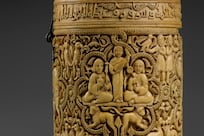TEL AVIV //Leaked documents from peace talks in 2008 provoked surprise and anger among Palestinian leaders yesterday for suggesting they had secretly offered to make much bigger concessions to Israel on the sensitive issues of Jerusalem and the fate of refugees than had previously been publicly known.
Palestinian officials vehemently denied the claims in the documents that have already been dubbed the "Palestine Papers" by the Al Jazeera television channel, which reported them late on Sunday.
Saeb Erekat, the chief Palestinian negotiator, told Al Jazeera that the reports were a "bunch of lies", while Mahmoud Abbas, the Palestinian president, told the Reuters news agency that the documents deliberately confused Israeli and Palestinian positions.
"What is intended is a mix-up. I have seen them yesterday present things as Palestinian, but they were Israeli … This is therefore intentional," he said.
The memos, a fraction of some 1,600 documents from the peace process in the past decade that Al Jazeera said it had obtained in recent months from several sources that it did not identify, were likely to hurt Palestinian leaders' image because they also showed that Israel had offered no major concessions of its own in return. Israel rejected the Palestinian proposal in 2008 on the grounds that it did not go far enough.
Central to the revelations, which the Qatar-based channel called the biggest leak of confidential documents in the history of the Middle East conflict, were leaked minutes from a June 2008 meeting in Jerusalem between Tzipi Livni, the then Israeli foreign minister, Condoleezza Rice, the then US secretary of state, Ahmed Qurei, the former Palestinian prime minister, and Mr Erekat.
At that time, the government of the former Israeli prime minister, Ehud Olmert, had conducted peace talks with the Palestinians, but they were cut off when Israel launched a deadly three-week attack against the Islamist group Hamas in the Gaza Strip in December 2008.
The minutes showed that Mr Qurei offered to allow Israel to annex all but one of the Jewish settlements that it had built in East Jerusalem - the Har Homa enclave - as part of a peace deal. "This is the first time in history that we make such a proposition," he was quoted as saying in the minutes.
In another meeting in October 2009, Mr Erekat offered that the Israelis would keep control of the Jewish quarter and part of the Armenian quarter of the Old City as part of a geographical division of the area.
Mr Erekat was quoted later as telling an adviser of Barack Obama, the US president, while using the Hebrew word for Jerusalem, that the Palestinian offer "gives them the biggest Yerushalayim in Jewish history", according to Al Jazeera.
Palestinians have said they wanted East Jerusalem as the capital of their future state and have publicly condemned Israel's continued expansion of Jewish enclaves in the area. Israel views East Jerusalem, which it captured in the 1967 Middle East war and annexed in a move not recognised internationally, as part of its capital.
The documents showed that Mr Erekat had proposed that the Palestinians cede control over the compound of Al Aqsa mosque, Islam's third-holiest site, in Jerusalem's Old City to the oversight of an international committee that would include Israel, the Palestinians, Jordan, Egypt and Saudi Arabia.
The leaks also suggested that Palestinians had been willing to make major concessions on the issue of the right of return of Palestinian refugees who had lost their homes in the 1948 war that created Israel. According to the documents, they consented for Israel to take in a mere 100,000 refugees, or some 10,000 per year for 10 years, out of a total of several million refugees and their descendants. The Israelis have in the past rejected accepting Palestinian refugees, claiming that they would jeopardise the Jewish character of the state.
There was no official reaction yesterday from the government of Benjamin Netanyahu, the Israeli prime minister, whose direct talks with the Palestinians were suspended last year over his refusal to freeze settlement construction. Ms Livni, currently the opposition leader and head of the centrist Kadima party, issued a statement saying that she would "continue to maintain discretion to the talks, in order to protect Israeli interests".
But the ultranationalist Israeli foreign minister, Avigdor Lieberman, made a bid to take advantage of the memos to advance his controversial plan for reaching a long-term temporary peace arrangement with the Palestinians, which the latter have repeatedly rejected as they insist on a final deal.
Speaking in an interview with an Israeli radio station yesterday, he said that the current predominantly right-wing government cannot be expected to reach a peace pact if its predecessor, a more centrist government, failed to clinch one.
"The documents show that if Olmert and Livni also did not succeed in reaching an accord with the Palestinians, despite the many concessions … everyone will eventually conclude that the only solution is a long-term provisional arrangement," he said.




